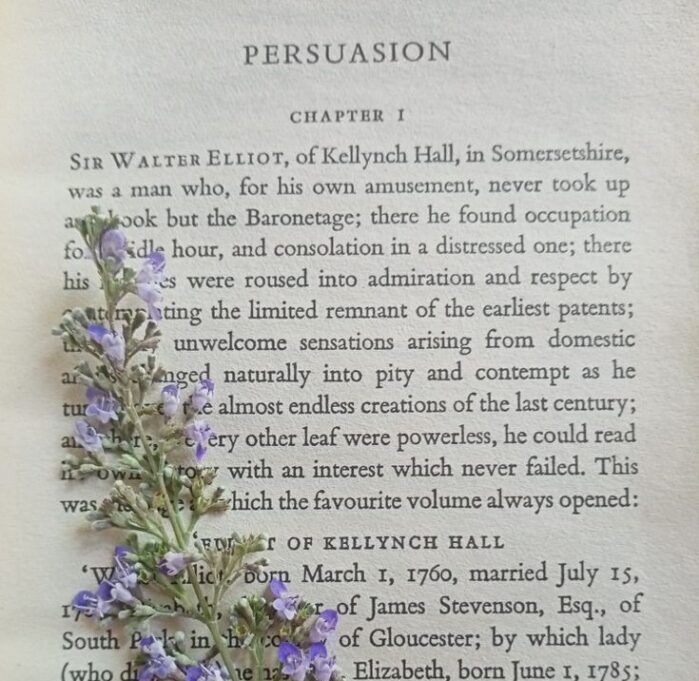By Dariga Atayeva, Year 12
Jane Austen’s last novel, written during her sickness and published after her death in 1817, is considered her most mature and complex literary work, redefining the genre of romance.
The novel, set during the Napoleonic Wars, highlights key historical moments in Britain’s involvement in battles such as the Battle of Trafalgar (1805) and the Battle of Saint Domingo (1806). It serves as a deeper exploration of the social lives and inner complexities of the people living in Britain at the time through their responses to these events. Anne, the heroine of the novel, is 27 years old, an age at which a woman would have been considered to have “lost her bloom” by societal norms in 1817. However, through characterising Anne at a more mature age, Jane Austen challenges these norms through the introduction of her romantic interest, Frederick Wentworth.
Eight years before the beginning of the novel, Anne met Frederick Wentworth, with whom she had a romantic dalliance, however broke it off as a result of Lady Russell, her godmother’s, argument regarding his low social status. Thus, the theme of persuasion presides throughout the whole novel since as a result of it, Anne remains in solitude until Wentworth’s return from the navy, when he had already gained a considerable rank (at the Battle of Saint Domingo) and made a great name for himself.
Meanwhile, Sir Walter Elliot, the father of Anne and her sisters Elizabeth and Mary, is unable to manage his savings after the death of his wife. This leads him to be persuaded by his lawyer to sell Kellynch Hall (their family estate) to the Crofts and move to Bath. Anne, the most reasonable and likeable character within her family (as her sisters and father are characterised as vain, careless and selfish) stays with Mary in Uppercross, not far from Kellynch Hall, where she is “glad to be thought of some use” (p.32). On the 29th of September (during Michaelmas), Kellynch Hall is turned over to the Crofts. Mrs. Croft is the sister of Captain Wentworth and thus meets Anne once again in October while he is visiting. The irony here is that Anne’s social status worsened over time, compared to Wentworth’s much improved status; Austen’s habit of using irony to expose the hypocrisy of and ridicule the English society is prevalent throughout the novel.
As Captain Wentworth returns to Britain, tensions arise. Wentworth declares “it is the worst evil of too yielding and indecisive a character, that no influence over it can be depended on.–You are never sure of a good impression being durable. Everybody may sway it” (p.74) where he identifies the problem of anxious and indecisive people with their susceptibility to persuasiveness, indirectly referring to Anne. However, contradictory to his point, Wentworth wants to influence women. He believes that a woman is to be the representation in which a man may behold what he once was. In his return to England in 1814, Wentworth, as a determined character, has made up his mind about the past’s significance: he has not forgiven Anne. Wentworth then learns his lesson of keeping his future open and uncertain – “The past which the characters thought was finished not only returns, it returns transformed and renewed by reinterpretation”.
This creates an insightful parallel with the reality of passing time in the aftermath of the war with rapid modernization, and with the paradoxically restored the political status quo, as in 1815, Continental Europe saw the reestablishment of the old monarchies.
Undoubtedly, historical context influenced Jane Austen’s writing. Like many writers of the time, Austen portrays the ordinary lives of the common people as so that history no longer seemed solely composed of the actions of “great men” engaged in politics.
The idea of time, and the comparison of past and present is a recurring theme which is seldom explored in our lives. Jane Austen asks the question of whether it is possible for people to keep their faith in their memories and to stay true to the past without isolating themselves from change. Persuasion compels us to reflect on what it means to move on from the past.
Persuasion‘s historical context can be summarised as a time during which the characters lived in a society of great historical change, thus making the future more uncertain than ever.
Certainly, although seemingly short, this is a hefty book with a plethora of themes and ideas to uncover. I really enjoyed reading it and would recommend it to anyone interested in the effects of time in regard to society and the consistency of romance. However, sometimes I found that the unlikable characters lacked realism and that the novel remained overly focused on their flaws, ignoring the complexities of human nature. Nevertheless, it is a valuable classic in understanding many of the elements I covered (and have not covered, as going further would make this article neverending!).



